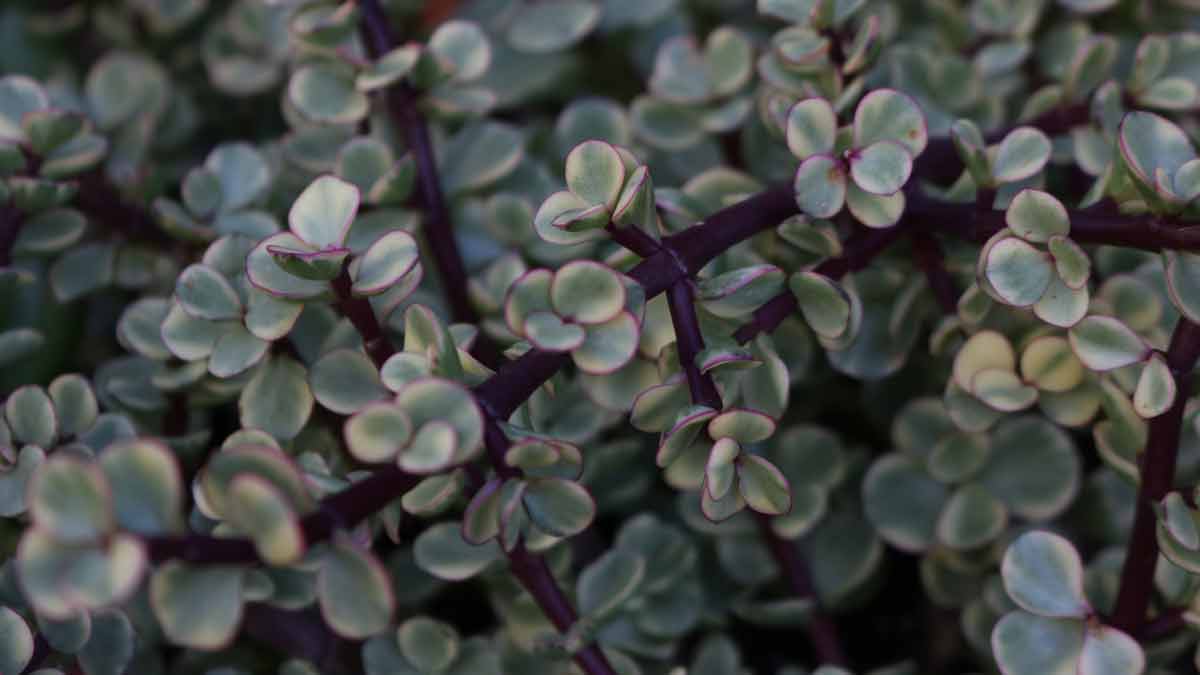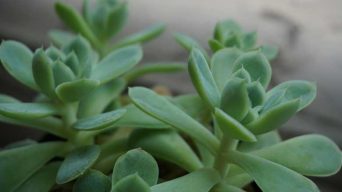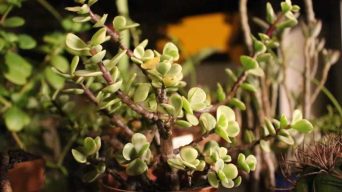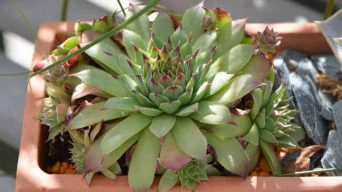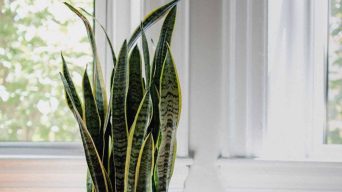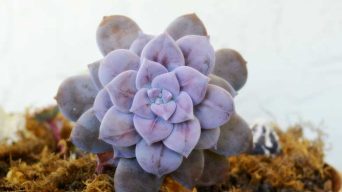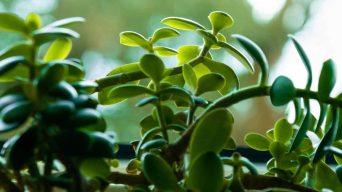Elephant Bush leaves may fall due to overwatering, underwatering, temperature stress, pests, diseases, nutrient deficiency, poor soil quality, or natural leaf drop. To prevent this, maintain proper care, check for pests/diseases, and ensure the right environment. Fallen leaves can be composted or used as mulch.
Portulacaria afra, more commonly known as elephant bush, is a succulent native to South Africa.
It’s become a popular houseplant due to its low-maintenance care requirements and unique appearance.
However, even the most experienced plant parents may run into problems from time to time. One common issue is elephant bush leaves falling off.
This article will discuss the three most common reasons elephant bush leaves may fall off and how to fix the problem.
What Causes Elephant Bush Leaves to Fall Off?
Elephant bush care is relatively straightforward, but a few things can go wrong.
Identifying the cause of elephant bush leaves falling off is essential to fix the problem and prevent it from happening again.
The most common causes of elephant bush leaves falling off are:
1. Overwatering
One of the most common reasons elephant bush leaves fall off is overwatering. This is especially true for plant parents new to caring for succulents.
Overwatering occurs when too much water is added to the soil, causing the roots to rot. This can cause several problems, including elephant bush leaves dropping.
If you suspect that overwatering is the cause of elephant bush leaves falling off, check the soil.
You’re probably overwatering if it’s soggy or feels wet to the touch.
The best way to fix overwatering is to let the plant dry out completely before watering again.
If the roots are already damaged, you may need to repot the plant in fresh, dry soil.
2. Underwatering
Underwatering is another common reason for elephant bush leaves falling off. Unlike overwatering, underwatering is when the plant doesn’t have enough water.
This can cause the leaves to turn brown and crispy and eventually fall off.
If you think that underwatering is the cause of the leaves falling off, check the soil.
If it’s dry to the touch, it’s probably time to water your plant.
The best way to fix underwatering is to water your plant more frequently.
If the leaves are already damaged, they may not recover, but new growth should be healthy.
3. Temperature Stress
Temperature stress is another common reason for elephant bush leaves falling off. This can happen if the temperature in your home is too hot or too cold.
The leaves may turn brown and crispy if the temperature is too hot. The leaves may turn black and mushy if the temperature is too cold.
Temperature stress can also cause elephant bush stems to break.
If you think that temperature stress is the cause of elephant bush leaves falling off, check the temperature of your home.
Elephant bush prefers temperatures between 65 and 75 degrees Fahrenheit.
If the temperature is outside this range, adjust it gradually. Sudden temperature changes can be just as stressful for plants as extreme temperatures.
The best way to fix temperature stress is to acclimate the plant to its new environment slowly.
4. Pests
Pests are another common problem that can cause elephant bush leaves to fall.
Common elephant bush pests include mealybugs, aphids, and spider mites. These pests suck the nutrients out of the plant, causing the leaves to turn yellow and eventually fall off.
If you think that pests cause elephant bush leaves to fall off, check the plant carefully for signs of pests.
Common signs include webbing, small bugs, and sticky leaves.
If you find pests in your plant, there are several ways to get rid of them. You can use a pesticide or try a natural method like neem oil.
You can also try to remove the pests by hand using a cotton swab dipped in rubbing alcohol.
5. Diseases
Diseases are another possible reason for elephant bush leaves to fall off.
The most common diseases that affect the elephant bush are root rot and powdery mildew.
Root rot is caused by too much water, while powdery mildew is caused by a fungus that spreads in humid conditions.
If you think that disease is the cause of the succulent plant leaves falling off, check the plant for signs of disease.
Root rot can cause the leaves to turn yellow and mushy, while powdery mildew will cause a white powder to form on the leaves.
If you find signs of disease, you’ll need to take action to treat it.
Root rot can be treated by letting the plant dry out completely and then repotting it in fresh soil.
Powdery mildew can be treated with a fungicide.
6. Nutrient Deficiency
Nutrient deficiency is another possible reason for elephant bush leaves to fall off.
This is most commonly caused by a lack of nitrogen in the soil.
If you think that nutrient deficiency is the cause of elephant bush leaves falling off, check the leaves for signs of nutrient deficiency.
The leaves will turn yellow if the plant lacks nitrogen.
You can treat nutrient deficiency by fertilizing the plant with a nitrogen-rich fertilizer.
If you don’t want to use fertilizer, you can also try adding compost to the potting soil.
7. Poor Soil Quality
Poor soil quality is another possible reason elephant bush leaves fall off.
This can be caused by several factors, including lack of drainage, compaction, and poor aeration.
If you think that poor soil quality is the cause of elephant bush leaves falling off, check the soil for signs of problems.
Lack of drainage will cause the soil mix to stay soggy after watering, while compaction will make it difficult for roots to grow.
Poor aeration will cause the soil to be dense and heavy.
You can improve the quality of your potting soil by adding organic matter like compost or peat moss. This will help to improve drainage, aeration, and nutrient availability.
You can also use a raised bed or container to plant elephant bush. This will help to improve drainage and aeration.
8. Transplant Shock
Transplant shock is another possible reason for elephant bush leaves to fall off.
This can happen when a plant is moved to a new location or repotted into a new pot.
The plant will undergo a period of adjustment as it tries to acclimate to its new environment.
During this time, the plant may lose some leaves.
If you think that transplant shock is the cause of Portulacaria afra leaves falling off, give the plant time to adjust to its new location.
It should start to grow new leaves within a few weeks.
You can help the plant adjust to its new environment by providing optimal growing conditions.
This includes plenty of sunlight, water, and nutrients.
You should also avoid moving the plant too often.
9. Too Much Sunlight
Too much sunlight is another possible reason elephant bush leaves fall off.
The elephant bush is a succulent, so it needs plenty of sunlight to grow. However, too much direct sunlight can be harmful to the plant.
If you think that too much sunlight is the cause of elephant bush leaves falling off, check the plant for signs of sun damage.
The leaves will turn yellow or brown if they get too much sun.
You can protect the plant from too much sun by placing it in an area that gets indirect sunlight. Place it near a window that gets either morning or afternoon sun.
You can also use a sheer curtain to filter out some of the sunlight.
10. Not Enough Light
Not enough light is another possible reason elephant bush leaves fall off.
The elephant bush needs plenty of sunlight to grow, so if it’s not getting enough light, it will start to lose leaves.
If you think that not enough light is the cause of elephant bush leaves falling off, check the plant for signs of low light.
The leaves will turn yellow or pale if the plant isn’t getting enough light.
You can provide the plant with more bright light by placing it in an area that gets full sun. You can also use grow lights to supplement the plant’s sunlight.
11. Chemical Damage
Chemical damage is another possible reason for elephant bush leaves to fall off.
This can happen if the plant comes into contact with chemicals like herbicides, pesticides, or fungicides.
It can also happen if the plant is grown in soil with high chemical pollutants.
If you think that chemical damage is the cause of elephant bush leaves falling off, check the plant for signs of damage.
The leaves will turn yellow or brown and may have burns or lesions.
You can protect the plant from chemical damage using natural pesticides and herbicides. To avoid chemicals, you can also grow elephant bush in an organic potting mix.
12. Natural Leaf Drop
Natural leaf drop is another possible reason elephant bush leaves fall off.
This is a normal process that happens as the plant grows. The elephant bush will naturally shed old leaves as it produces new ones.
If you think that natural leaf drop is the cause of Portulacaria leaves falling off, check the plant for signs of new growth.
You should see new leaves growing from the plant if it’s shedding old ones.
Natural leaf drop is nothing to worry about, but you can help the plant to shed its leaves by pruning them off. This will help the plant to focus its energy on new growth.
13. Rootbound
Rootbound is another possible reason for elephant bush leaves to fall off.
This happens when the plant’s roots have become too crowded in the pot. The plant can’t absorb enough water and nutrients, so it starts to lose leaves.
If you think that rootbound is the cause of elephant bush leaves falling off, check the plant for signs of stress.
The leaves will turn yellow or brown, and the plant may be wilting.
You can fix the problem by repotting the elephant bush in a larger pot. This will give the roots more room to grow.
To improve drainage, you should also consider adding some organic matter to the potting mix.
How To Prevent Elephant Bush Leaves From Falling Off
You can do a few things to prevent Portulacaria afra leaves from falling off.
Here are some tips:
1. Keep the Plant Out of Direct Sunlight
Keep the plant out of direct sunlight to prevent elephant bush leaves from falling.
Too much sun can damage the leaves and cause them to fall off.
Instead, place the plant in an area that gets indirect sunlight. You can also use a sheer curtain to filter out some of the sunlight.
2. Water the Plant Properly
To prevent elephant bush leaves from falling off, water the plant properly.
The elephant bush plant needs to be watered deeply, but not too often.
Water the plant when the top inch of soil is dry. Be sure to empty any water collected in the saucer under the pot.
3. Prune the Plant Regularly
To prevent elephant bush leaves from falling off, prune the plant regularly.
Pruning will help the plant to focus its energy on new growth.
It will also help to keep the plant compact and prevent it from getting too leggy.
To prune the elephant bush, cut back the stems by a third. You can do this every few months to keep the plant healthy.
4. Fertilize the Plant Regularly
To prevent elephant bush leaves from falling off, fertilize the plant regularly.
The elephant bush needs to be fertilized once a month during the growing season.
You can use a balanced fertilizer or an organic fertilizer. Be sure to follow the instructions on the package.
5. Check for Pests and Diseases
Check for pests and diseases to prevent elephant bush leaves from falling off.
Pests and diseases can damage the leaves and cause them to fall off.
If you see any signs of pests or diseases, treat the plant immediately.
You can use a natural pesticide or an organic fungicide to treat the plant.
You should also quarantine any new plants before adding them to your collection. This will help to prevent the spread of pests and diseases.
6. Provide the Plant with Good Air circulation
To prevent elephant bush leaves from falling off, provide the plant with good air circulation.
Poor air circulation can lead to fungal diseases.
To improve air circulation, place the plant in an area with plenty of airflow. You can also use a fan to circulate the air around the plant.
7. Place the Plant in the Proper Temperature
Place the plant at the proper temperature to prevent Portulacaria afra leaves from falling off.
The elephant bush prefers to grow in warm temperatures.
If the temperature drops too low, the leaves will start to fall off.
To keep the plant warm, place it in a sunny spot. You can also use a grow light to provide the plant with additional warmth.
8. Provide the Right Soil Conditions
Provide the right soil conditions to prevent elephant bush leaves from falling off.
The elephant bush prefers to grow in well-drained soil.
If the soil is too wet, the roots will start to rot. This can damage the plant and cause the leaves to fall off.
To improve drainage, add some organic matter to the soil. You can also use a pot with drainage holes to prevent the roots from sitting in water.
9. Repot the Plant When Necessary
To prevent elephant bush leaves from dropping, repot the plant when necessary.
When the plant becomes pot-bound, the roots will start to suffocate. This can damage the plant and cause the leaves to fall off.
To prevent this, repot the plant every two or three years.
Be sure to use a large pot to accommodate the plant.
What Are the Benefits of Falling Elephant Bush Leaves?
Even though it may be alarming to see elephant bush leaves falling off, it is a normal process.
The plant sheds its leaves to conserve water and energy.
This process is known as abscission.
It typically occurs in the winter when the plant is dormant.
During this time, the plant will stop growing and focus on storing energy for the next growing season.
In some cases, the elephant bush may shed its leaves due to stress.
This can be caused by several factors, including pests, diseases, poor nutrition, and bad growing conditions.
While it may be unsightly, there is no need to worry if your elephant bush is shedding its leaves.
The plant will usually start to grow new leaves in the spring.
In the meantime, you can take steps to improve the plant’s growing conditions.
This will help to prevent stress and reduce the amount of leaf loss.
What To Do With Elephant Bush Leaves That Fall Off?
If you find elephant bush leaves that have fallen off, you can compost them.
The leaves will decompose and add nutrients to the soil.
You can also use the leaves as mulch.
Portulacaria afra plant leaves make great mulch because they are thick and durable.
They will help to suppress weeds and retain moisture in the soil.
If you don’t want to compost or mulch the leaves, you can throw them away.
Be sure to dispose of them so they won’t end up in the landfill.
Final Thoughts
If your elephant bush is dropping leaves, it is likely due to one of the reasons listed above.
To remedy the situation, you will need to take action based on the specific issue at hand.
By providing your plant with the proper care and attention, you can help it to thrive and prevent future problems.

